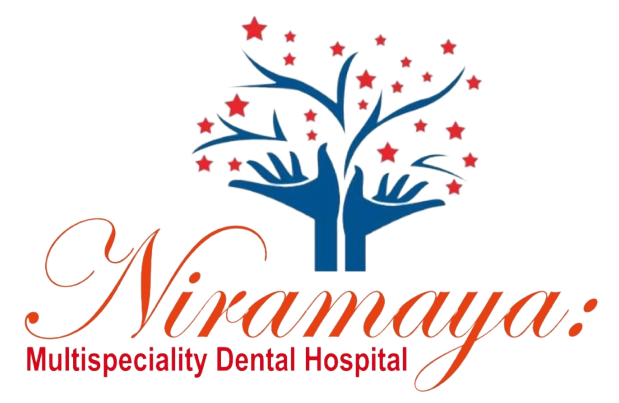Ask the Experts
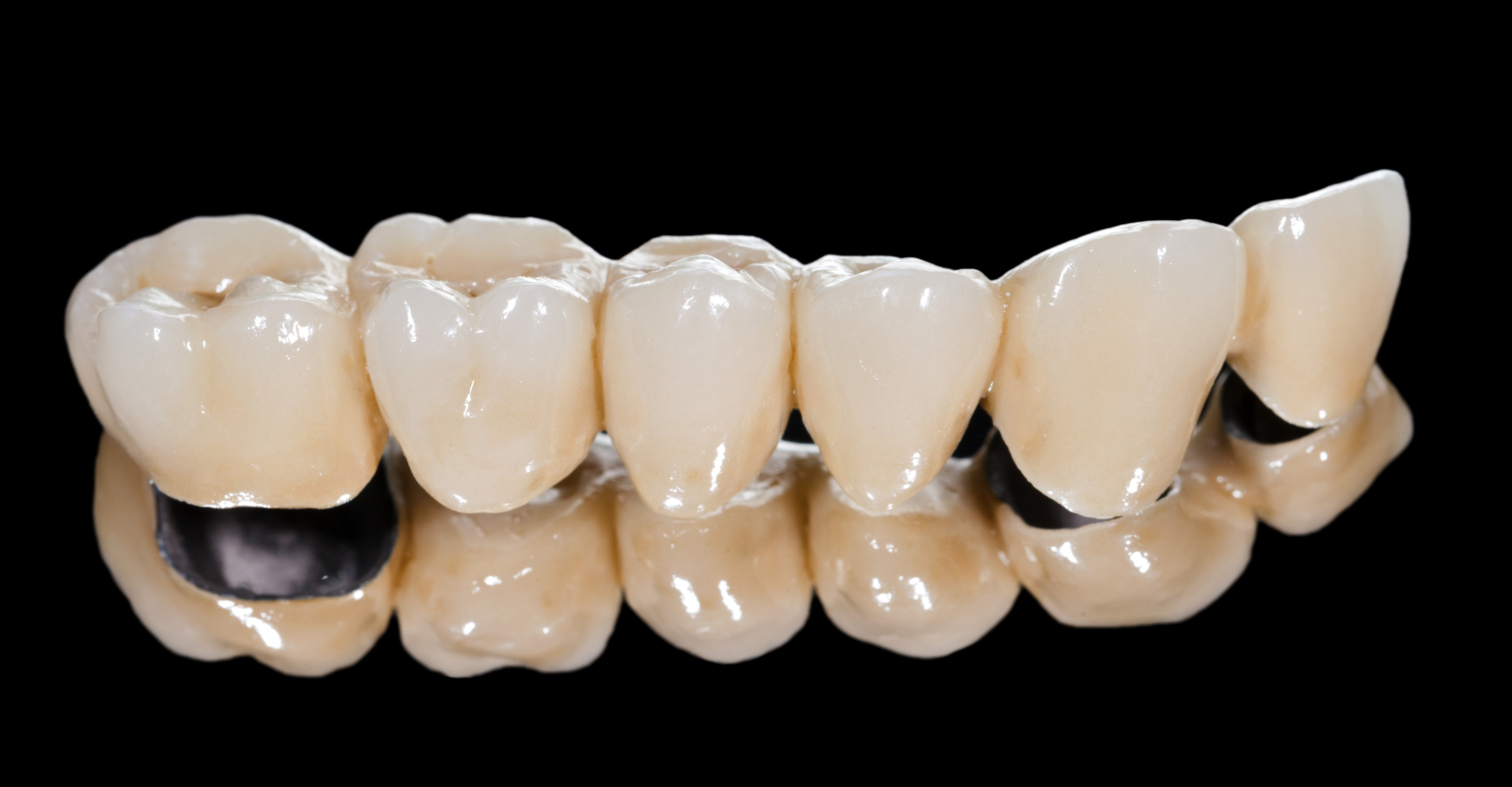
Crowns & Bridges
Dental crowns have long been a solution to restore the look and function of a damaged tooth. These tooth-shaped caps help restore your teeth and improve your smile.
Requirement of a Crown
Well, after a thorough examination during your first hospital visit, our dentist will evaluate your particular case, and guide you on all possible treatments. Generally, some of the most common causes of getting a dental crown are:
- A weakened tooth after severe decay or cavity
- To cover an implant
- To replace a large filling
- A natural tooth that is damaged or cracked
- A tooth that has undergone a root canal (especially posterior teeth)
- To align your bite
- For aesthetics purposes: to achieve a more beautiful smile by leveling the size, shape, and color of your teeth.


Procedure for getting a crown
In most cases you need a custom-made crown, be ready to visit us a couple of times. It is not something a dentist can do in only one appointment. It is a two to three step procedure which requires multiple visits. The process may be different for each type of dental crown, too. Our specialist Dr Sonam Nagar Pandit (MDS) will prepare your tooth, which can involve just the removal of decay, a root canal, or both. She takes an impression after preparation of tooth so that the crown fits the exact shape of your tooth. You should take special care of the prepared tooth and avoid eating hard or sticky foods to prevent it from cracking or getting damaged. Within 3-7 days your crown will be ready and you will get a call from our hospital for fixation of the same.

Types of Dental Crown
When you need a crown, you immediately start thinking about the types of dental crowns and cost. This is because today there are many different types of crowns that vary depending on materials, cost, procedures, and patients’ needs.
The main types of crowns used in dentistry include:
1. Metal crowns
Metal crowns are in fact a combination of copper and other metals, such as nickel or chromium. The main advantage of Metal crowns is their strength and durability. For posterior restorations and depending on each patient’s needs- our dentists may suggest you a metal crown as the preferred option. However, metal crowns don’t make a very popular choice today due to their color and aesthetics.
Main ADVANTAGES of metal crowns:
- They are strong and highly resistant
- They last a long time if properly cared for
- Less proportion of your natural tooth needs to be removed
- They wear down quite slowly, just like natural enamel
- They are ideal for posterior restorations (back teeth), especially second molars
Main DISADVANTAGES of metal crowns:
- Poor aesthetics: They obviously don’t look like a natural tooth
- Metal crowns can affect some people and produce some side effects such as allergic reactions or swelling but it is very rare.
- Metal crowns might have to be removed in case one under goes MRI scan in future.
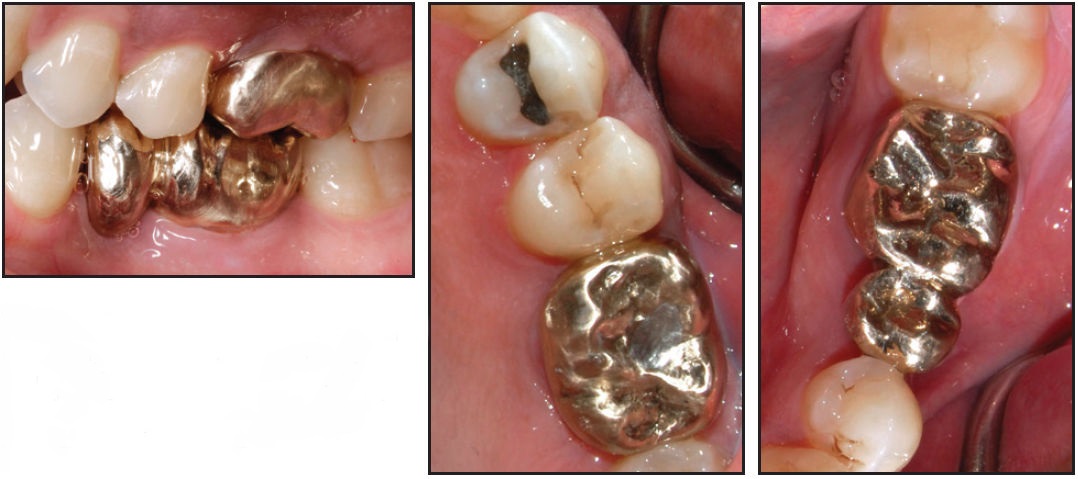
2. Porcelain Fused-to-Metal Crowns (PFM)
Porcelain fused-to-metal (PFM) crowns are another widely used type of dental crowns. They provide both strength (due to their metal structure) and aesthetics (due to the porcelain coat that covers the cap).
The main ADVANTAGES of PFM crowns are:
- They provide great aesthetics and durability
- They’ve been around for over 50 years. We know they work well.
- They are less costly than other aesthetic crowns.
However, the DISADVANTAGES of PFMs include:
- The metal in these crowns may cause a grey line at the gumline. This may not give the 100% aesthetic look that zirconia crowns provide.
- For people who clench their teeth, this type of crown may wear down more easily against the opposing teeth.
- There are changes that porcelain layer may get chipped off and underlying metal may get exposed giving it unaesthetic look.
- As metal is present in PFM crowns so these crowns might have to be removed in case one under goes MRI scan in future.

3. CAD- CAM (Computer Aided Design and Computer Aided Milling) PFM
CAD-CAM PFM ( full form is Computer Aided Design and Computer Aided Milling) is designed and precision milled with CAD CAM Technology with 5 years warranty. Excellent fit and excellent marginal integrity is great advantage of this technology. A precision fit and consistent quality providing you an excellent alternative in cases where the clinical situation limits the application of All Ceramic or zirconia restorations. Cobalt chromium restorations are milled from a solid monobloc and are both biocompatible. CAD/CAM provides the perfect combination of Strength, Esthetics, Fit and Affordability. CAD-CAM PFM is better than regular PFM. Regular PFM is handmade conventional method restoration.
The main ADVANTAGES of CAD-CAM PFM crowns are:
- Excellent fit and excellent marginal integrity
- Comes with a 5 years warranty.
- They are less costly than zirconia crowns.
However, the DISADVANTAGES of PFMs include:
- The metal in these crowns may cause a grey line at the gumline.
- For people who clench their teeth, this type of crown may wear down more easily against the opposing teeth.
- There are changes that porcelain layer may get chipped off and underlying metal may get exposed giving it unaesthetic look.
- As metal is present in CAD-CAM PFM crowns also these crowns might have to be removed in case one under goes MRI scan in future.
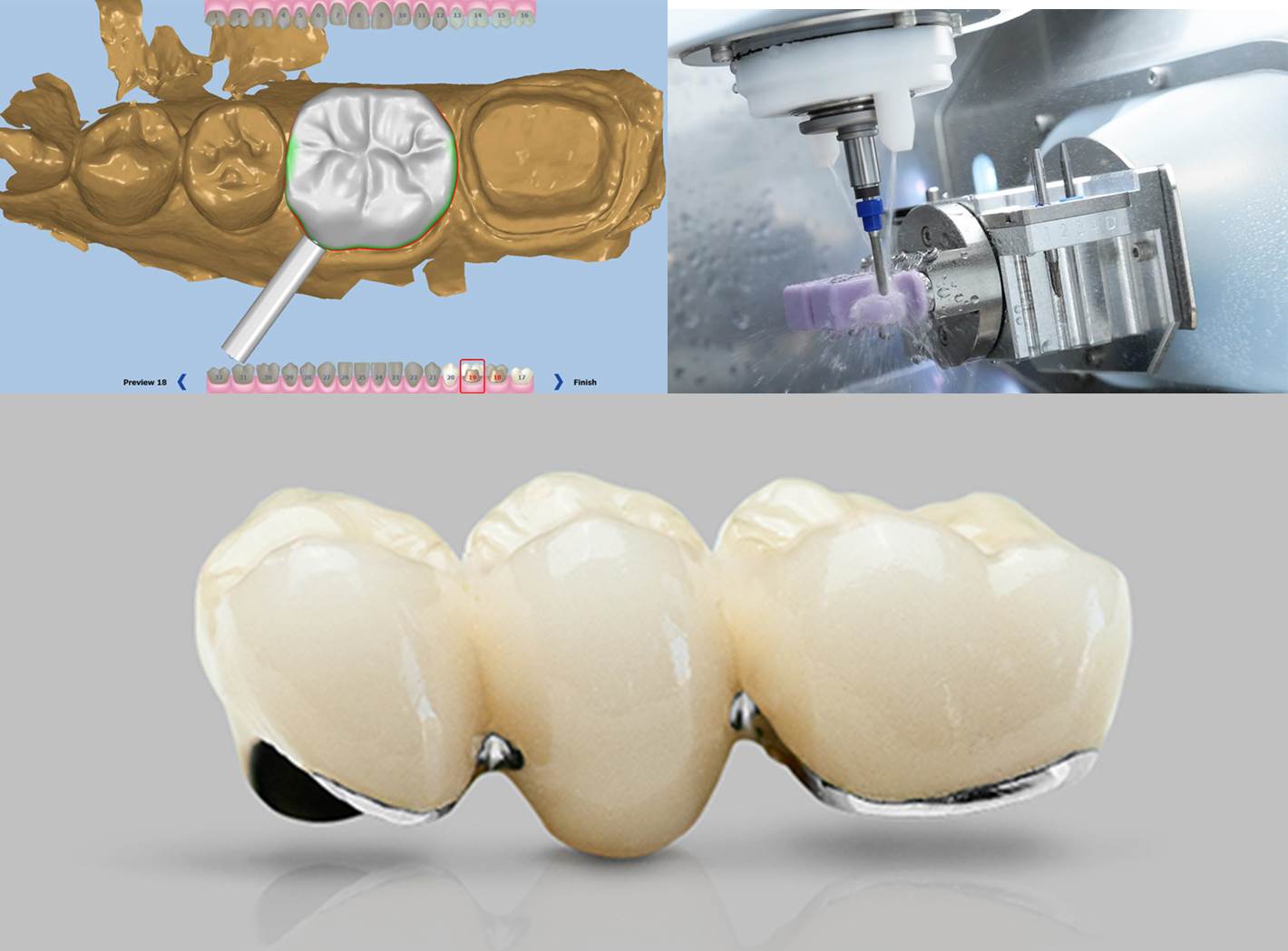
4. Zirconia Crowns
Zirconium is a relatively new material that combines the strength of metal with the aesthetics of porcelain crowns. High translucent zirconia and layered zirconia crowns have become a more popular choice lately.
The main ADVANTAGES of zirconia crowns are:
- They provide great aesthetics
- They are strong and long-lasting (less possibilities of chipping or breaking).
- Zirconia Crowns are less likely to wear down due to their strength.
- They are biocompatible: as metal free crowns, they are not likely to cause allergic reactions.
The main DISADVANTAGES of Zirconia Crowns include:
- Their strength can make the teeth they bite against wear down easily.
- Solid Zirconia can be difficult to adjust.
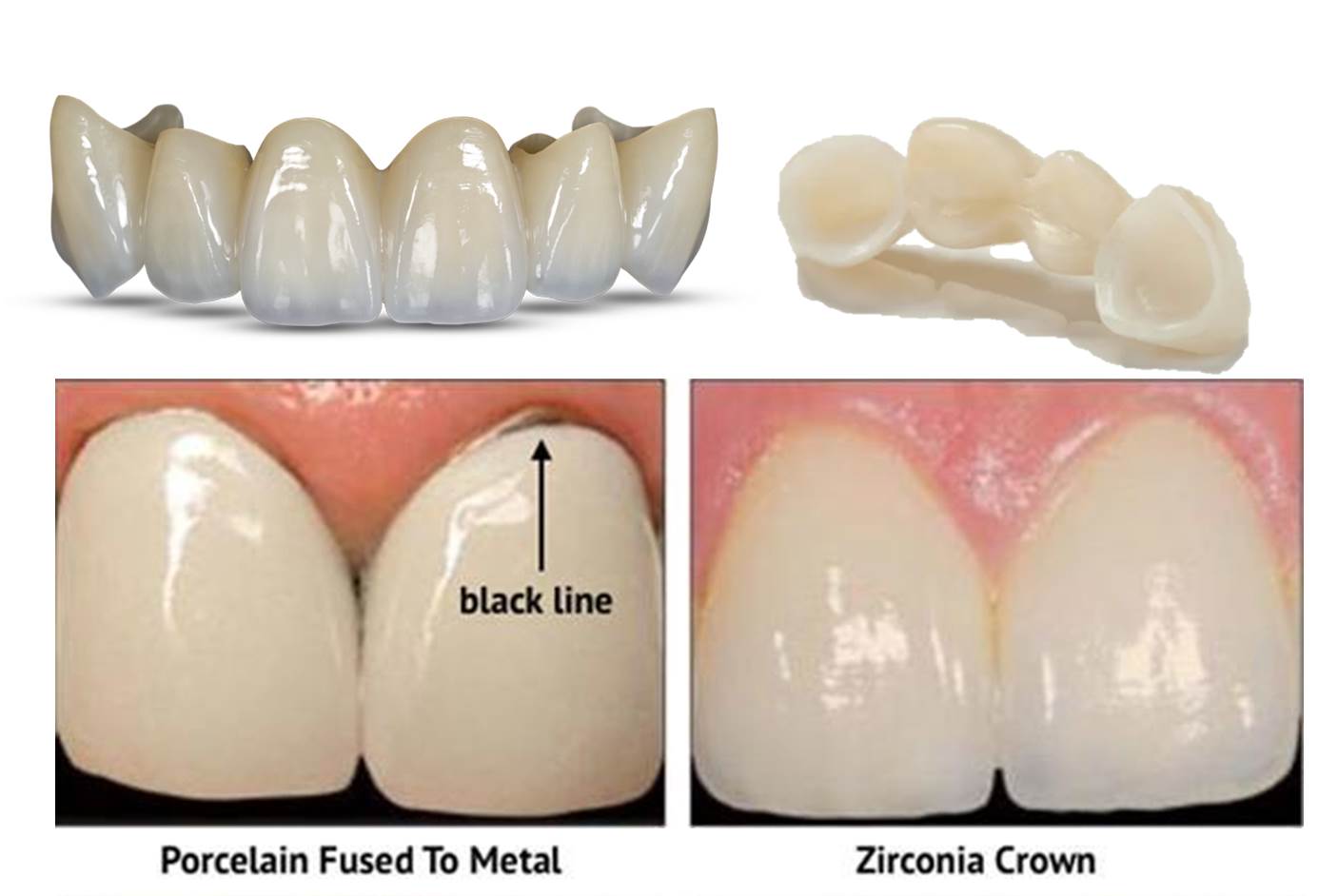
5. E- MAX: Lithium Disilicate Crowns
The newest type of crown in dentistry today is known as E -Max. It is a type of all-ceramic crown made of lithium disilicate (which is also light and thin).
The main ADVANTAGES of E-max crowns are:
- Great aesthetics. They look great in your mouth.
- They can be durable and very strong.
- They provide a great choice both for front and back teeth.
The main DISADVANTAGES of E-Max Crowns include:
- They could be more expensive.
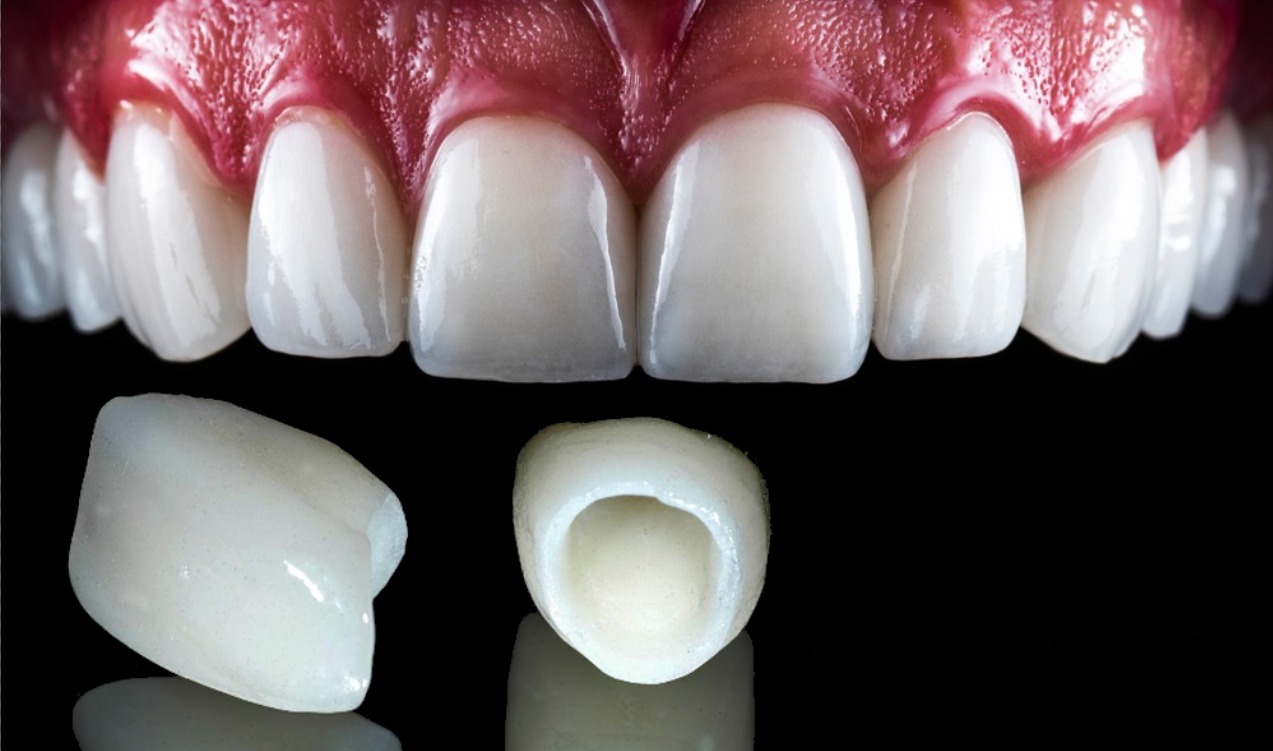
FREQUENTLY ASKED QUESTIONS
What Is The Cost of Dental Crowns?
Cost will vary depending on the material used and the preparation required. For example, all porcelain crowns are in general more costly than metal ones. Moreover, in some instances a core build-up is required to help protect the integrity of the tooth before a crown can be placed.
Other times, dentists need to perform a gingivectomy or minor gum surgery, procedure in which part of the gums are cut away in the mouth to ensure better aesthetics or prognosis of the tooth or teeth. In the worst case scenario, you might also need a root canal, in which case the overall cost of the procedure could easily double. You can always book an appointment with us at +91-759-766-7777 & visit us to know the exact costing & best crowns for you.
What Should I Consider When Getting a Dental Crown?
A dental crown is a long-lasting restorative treatment. That means you will have a crown for many years in your mouth. Certainly, you want to have it done in the most professional and skillful way. So, if possible, when considering types of dental crowns and cost, try not to go directly to the least expensive dentist without analyzing your options. Weigh in all factors before deciding. A specialist MDS is always the right person to get your root canal & crowns done. Maybe it’s better to spend a bit more and be sure the results will be good and long-lasting. Choosing only cheap options may lead to poor quality treatments which, in turn, will mean more money, more time and more discomfort in the future.
What Materials Are Used in Dental Crowns?
There are different types materials used in dental crowns. The most commonly used materials are porcelain, porcelain fused to metal, gold and the new material called zirconium. They all vary in price and serve different purposes and budgets.
What Are the Most Common Dental Crown Problems?
A dental crown is a long term restoration that provides a solution for many dental problems such as tooth decay, broken teeth, sensitivity, infections, etc. Once you get the dental crown, you should take good care of it and have it checked regularly to avoid problems such as getting cavities underneath the crown, having your crown chipped or broken, or feeling strong discomfort in that area. Even if you feel there is constant food lodgement in or adjacent to your crowns you should immediately book an appointment with us for checkup. Early action in these situations may present further damage to your teeth.
